The aftermath of Nigeria’s highly anticipated 2023 presidential election, which took place in February, proved to be exceptionally contentious, marking it as one of the most disputed outcomes since the country’s return to democracy in 1999. This was despite the implementation of advanced technological measures aimed at combating election fraud and manipulation.
The Independent National Electoral Commission (INEC) had assured the public of conducting a credible election with innovative safeguards for transparency and fairness. However, the election failed to meet expectations as it faced alarming allegations of electoral misconduct, including result tampering to diminish opposition votes.
These allegations targeted both INEC and its officials after the official declaration of Bola Ahmad Tinubu, the candidate from the ruling party All Progressive Party (APC), as the president. In response, the top two opposition parties, particularly the Peoples Democratic Party (PDP) and the Labour Party (LP), approached the electoral petition court to challenge the declared results.

A screengrab of some of the Facebook pages highlighting the alleged meeting. (Source: CfA using CrowdTangle)
Doubts about the election spurred, from what INEC termed a ‘technical glitch’, for not transmitting results electronically.
Already, the Presidential Election Petition Tribunal has affirmed the validity of the presidential election won by the APC but the nation awaits patiently the outcome of the next judicial showdown between the leading political parties at the supreme court.
Before then, the highest-ranking judge, Chief Justice of Nigeria (CJN), Justice Olukayode Ariwoola had become the target of a vicious online troll attack.
This attack followed a viral and misleading media report which put the judge’s reputation and integrity into question.
Published On March 23, the Peoples Gazette, an online media outlet, stirred a controversy with its report alleging that Justice Olukayode Ariwoola, secretly met with President Bola Ahmad Tinubu in London. The contested allegation insinuated that the two high-profile figures could be engaged in a conspiracy.
At first, there were allegations circulated, claiming that Justice Ariwoola was bribed with a colossal sum of $200 million to sway the tribunal’s outcome in the president’s favour. Alarmingly, these claims lacked evidential support, yet fueled harsh sentiments.
Consequently, the publication provoked reactions in the open social media, notably characterised by an onslaught of online criticism targeting both the CJN and the entire judicial institution.
The report gained traction rapidly in the social media space. Notably, it garnered attention on the People’s Gazette’s X page, formerly Twitter, receiving 2,200,000 views and a total interaction of 25,511 with the tweet being retweeted 9,559 times.
This surge of attention subsequently led to the posting of numerous other fake and deliberately deceptive claims, allegedly designed to smear the reputation of Justice Ariwoola.

A screengrab of the alleged X post from the online media outlet. (Source: CfA using X)
The contentious story found considerable traction on Facebook as well, receiving a total interaction of 2,487 with posts being shared 904 times, with the post becoming a hotbed of harsh comments directed towards the Chief Justice of Nigeria, intensifying the online attack of criticism he faced.
Other alleged meetings
Before the misleading report’s release, the APC’s supporters had dismissed the opposition parties’ grievances regarding the election results. They staunchly advocated for the opposition to channel their objections through the legal system, rather than airing their grievances on social media platforms. In a swift retort, however, opposition parties alleged that the ruling party had employed underhanded tactics, insinuating that judges overseeing the case may have been bribed. These counterclaims deepened the rift between the opposing factions and cast a cloud of suspicion over the legitimacy of the judicial process concerning the electoral dispute.
Following the Independent National Electoral Commission (INEC)’s declaration, the phrase “Go to court” became a trending topic on X attracting 270,000 mentions in the period from 28 February to 30 April. This call-to-action phrase quickly proliferated across the platform, boasting a significant number of mentions. The phrase became a refrain to both highlight allegations of flagrant cheating against the opposition and simultaneously goad them into challenging the electoral outcome in a court of law, as opposed to merely voicing complaints about the electoral process.
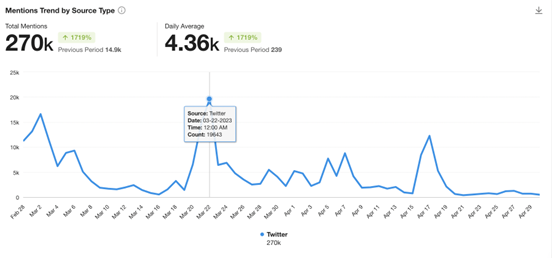
A screengrab of total mentions for the keyword ‘Go to court’.(Source: Meltwater)
On 03 March 2023, the digital sphere buzzed with activity when an intriguing X post began to circulate. This post suggested an undisclosed meeting between the Chief Justice, Olukayode and Tinubu, at the latter’s residence with no context or evidence provided in the report.
The ‘patient zero’ post appealed to Nigerians’ sense of accountability by urging them to question the motives behind this supposed rendezvous on the evening of 02 March 2023.
However, this narrative, which was seemingly copy-pasted and widely shared by a number of X accounts, gained traction. It was propagated to such an extent that it caught the attention of the People’s Gazette, which then published the information.
This resulted in further reinforcement of confirmation bias among opposition supporters, leading them to question the impartiality of the judiciary. Yet, no concrete evidence to substantiate these claims had been presented, leaving the narrative built more on speculation than on verifiable facts.
What the report stated
Published on 23 March 2023, a specific report circulated caused outrage across the country. It insinuated that the Chief Justice of Nigeria, Olukayode Ariwoola, had clandestinely embarked on an international journey. According to this account, Ariwoola, seemingly incognito, left the country on March 11 to London with Bola Ahmed Tinubu.
The report’s descriptions painted an elaborate picture of the alleged ruse. It suggested that Ariwoola, in an apparent effort to maintain a low profile, was transported in a wheelchair through the airport and into his London hotel room. The narrative further added a dramatic flair by stating, “Upon his arrival in London, the 64-year-old Ariwoola was wheeled into a downtown hotel, where he has remained. However, soon after settling into his room, Ariwoola purportedly abandoned the wheelchair, moving around the facility without assistance.”
The report pointedly noted that Ariwoola has no known physical disabilities, further heightening suspicions about the alleged covert operation.
Interestingly, the report failed to confirm whether the supposed meeting between Ariwoola and Tinubu transpired. However, the subsequent confirmation that the President had left the country a few days post-publication added a thread of plausibility to the report’s narrative. Even though the connection might be tenuous, it certainly gave the account an air of credibility, further fueling the intrigue.
Anticipated responses
In the wake of the controversial report, responses from the involved parties were eagerly anticipated. While initially, the report claimed that the President-elect and Chief Justice’s spokespeople failed to provide any comment, the Chief Justice’s office eventually issued a response that contradicted some of the report’s claims.
Dr. Festus Akande, the spokesperson for the Chief Justice, provided a timeline that significantly differed from the one in the report. According to Akande, the Chief Justice didn’t depart for London on 11 March, as suggested, but rather on 18 March 2023. Prior to this trip, he had presided over National Judicial Council (NJC) meetings on 16 -17 March. A crucial outcome of these meetings was the decision to suspend the Chief Judge of Taraba State, Philibus Andetur. Akande added that it was only after these NJC meetings that Chief Justice Ariwoola, accompanied by NJC Secretary Gambo Saleh, embarked on a trip to London for medical care. Ariwoola reportedly returned from this medical trip on 23 March and later resumed work at his office in Abuja.
Meanwhile, a spokesperson for the President-elect, Tinubu, vehemently denounced the story as false. Tinubu’s spokesperson presented a distinct traveling schedule for Tinubu, including stops in France, London, and Saudi Arabia. He argued that Tinubu’s trip was for rest and recuperation following the strains of the recent electoral campaigns. Notably, he stressed that Tinubu had departed for France on 21 March, making a supposed meeting with the Chief Justice in London logically implausible due to the differing timelines.
Aftermath of the report
The report heightened speculation surrounding a potential meeting between Chief Justice Ariwoola and President-elect Tinubu. Despite this, it fell short of substantiating these claims with credible evidence. The narrative was further intensified with words like ‘disguised’, intended to highlight the supposedly secretive nature of Ariwoola’s departure from the country.
People’s Gazette, the source of the original report, clarified that they had deliberately refrained from using a photo of the Chief Justice during his journey and his hotel stay, citing the protection of a key source as the reason. However, in the days that followed, an image of Ariwoola in a wheelchair started making rounds on social media platforms.
This particular image depicted the Chief Justice being wheeled through what appeared to be an airport. Curiously, the so-called element of disguise was lacking in the picture. The use of wheelchairs at airports is a commonplace practice, especially for senior citizens or those with mobility challenges. Given Ariwoola’s age, it would be entirely reasonable for him to request wheelchair assistance during travel. Thus, the supposedly ‘incriminating’ image seemed to lose some of its perceived impact, as the use of a wheelchair would not be out of place for someone of the Chief Justice’s age, and did not necessarily indicate an attempt at disguise.

A screengrab of different Facebook pages highlighting the Chief Justice being pushed on a wheelchair. (Source: CrowdTangle)
Intriguingly, the backdrop in the image seemed to suggest that the image was taken in Nigeria. However, in a turn of events, the same image was used by various outlets to inaccurately imply that it had been taken in London. A case in point was a Facebook post by ABN TV, which claimed that the image depicted “Chief Justice of Nigeria, Ariwoola, in a wheelchair in London.” This wrong claim, even though there was proof showing it wasn’t true, made the developing story even more confusing.
How the report led to trolls and misinformation
By using the Crowdtangle tool, it was found that the topic was posted 228 times and received 17,149 responses on Facebook.
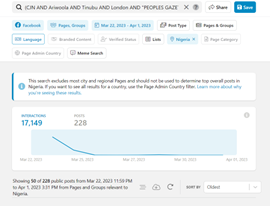
A screengrab showing the mention of the topic on Facebook. (Source: CrowdTangle)
The same tool revealed that discussion around the topic reached its peak on 23 March 2023, then fell off somewhat the following day. The initial report, published at 4:59 PM local time, attracted 1,348 reactions, but the tool showed that most of the topic’s spread on the platform was actually driven by screenshots of that original post.
Typically, these shared screenshots included the first paragraph of the report and were circulated within public groups. These groups were either owned by bloggers or associated with supporters of the two opposing parties. Upon further observation, it was noted that posts shared within groups that supported the Labour Party’s candidate seemed to attract the most attention and engagement.
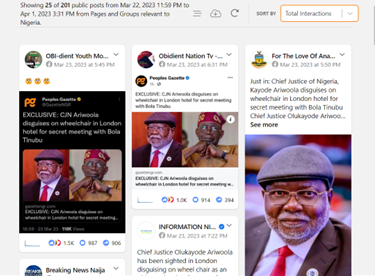
A screengrab of Facebook public pages using the first paragraph of the report to spread false claims. (Source: CrowdTangle)
Over on X, a tweet from Jackson Ude alleged, “Four officials from a private jet firm were seen leaving the hotel where the CJN Olukayode Ariwoola is staying on Park Lane, London. The plan is to sneak him out to Luton Airport and fly him to either Cotonou or Abuja, thereby preventing a planned deal-cutting meeting with Tinubu.” These substantial claims were made without the support of any +tangible evidence. The post received a viewership of 529,700 and total social interaction of 7248 and it was retweeted 4,037 times.
It was observed that the post was copy-pasted by different accounts on the platform hence aiding the spread of misinformation.
The same “patient zero” account in the context of viral misinformation posted another claim. This new allegation suggested that the Chief Justice was involved in negotiating a $200 million bribe, intended to be distributed among the judges assigned to the tribunal case. The post received a viewership of 234,400 and a total social interaction of 4,262.
In a similar manner, other posts tarnishing the reputation of the judge with accusations of corruption gained significant traction on the platform. Notably, a user by the handle @Michael William, who, according to his X bio, identifies himself as a US lawmaker, took to X to voice his critique. In his tweet, he painted Nigeria as a country that breeds criminals “from the Chief Judge to the lowest.” Alongside his inflammatory words, he also posted the picture of the Chief Judge being wheeled in a wheelchair.

A closer examination of the profile picture associated with the account, using a reverse image search, revealed that the image is actually of Merrick Garland, the current Attorney General of the United States. Additionally, a Google keyword search failed to identify any US lawmaker named Michael William, casting further doubt on the account’s authenticity. A deeper dive into the account’s activity also revealed a frequent posting pattern revolving around events occurring in Nigeria.
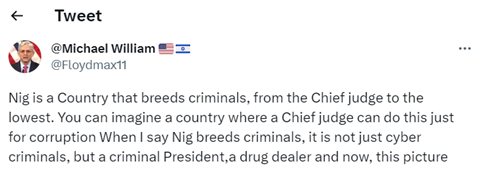
The tweet from the account was found to be impersonating the attorney General of the US. (Source: X)
Conclusion
It is evident from the foregoing discussion that, despite the absence of compelling evidence supporting the alleged meeting between the Chief Justice of Nigeria and Tinubu, the report served to tarnish the reputation of Nigeria’s most senior judge. Such negative representation risks damaging public confidence in the judiciary, traditionally viewed as the ultimate arbiter in resolving contentious cases.
The election results have deepened divisions among supporters on either side of the political spectrum. As a consequence, the judiciary’s decision regarding the election could face derision or dismissal in the wake of these damaging reports. The court’s credibility stands as a critical pillar for maintaining societal balance. Consequently, these unfounded allegations will sow seeds of doubt among the public and undermine the court’s authority, which can have far-reaching implications for the justice system and the stability of the nation.
This article was produced with mentorship from the African Academy for Open Source Investigations (AAOSI) to tackle disinformation that undermines our democracies, as part of an initiative by the International Centre for Journalists (ICFJ) and Code for Africa (CfA), in partnership with Daily Trust Foundation. Visit https://disinfo.africa/ for more information.
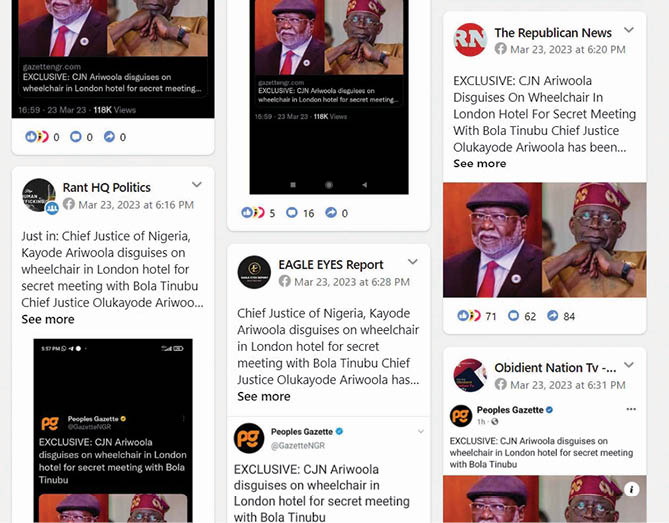
 Join Daily Trust WhatsApp Community For Quick Access To News and Happenings Around You.
Join Daily Trust WhatsApp Community For Quick Access To News and Happenings Around You.